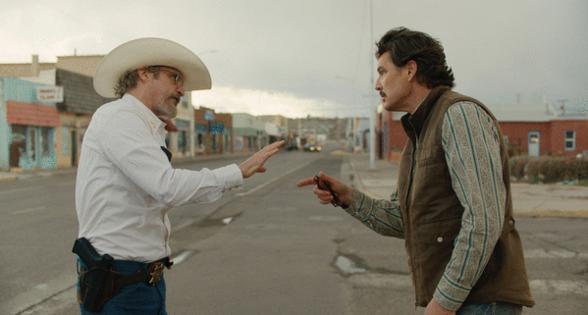Movie review: Ari Aster grapples with recent past in 'Eddington'
Published in Entertainment News
In every one of his films, writer/director Ari Aster has unpacked a trauma, usually his own. In the folk horror film “Midsommar,” it was relationships, while in “Hereditary,” “Beau Is Afraid,” and his short film, “The Strange Thing About the Johnsons,” he dove into family trauma to horrifying and absurdly comic ends. In his new film, “Eddington,” Aster tackles a collective American trauma using the most American of genres, the Western. That he trains his lens on recent history might feel too hot to handle, but it doesn’t mean that we can or should look away.
“Eddington” takes place in “late May 2020,” that’s how recent the history. In fictional Eddington, New Mexico, Sheriff Joe Cross (Joaquin Phoenix) is so inexplicably riled by draconian mask mandates that he impulsively decides to run for mayor against the charismatic incumbent, Ted Garcia (Pedro Pascal). But his goofy DIY campaign of misspelled signs and ranting through a speaker mounted on his sheriff’s vehicle is quickly disrupted by the explosive Black Lives Matter movement that sweeps through this small town.
In this desert setting, with characters both buffoonish and evil at once, there’s a distinctly Coen brothers slant to “Eddington.” At the center of the sausage roll is a bleak and bloody Western neo-noir, enveloped by the flaky dough of a deeply cynical COVID-set social satire that skewers The Way Things Were in 2020, and tries to understand or explain why these events made seemingly everyone go insane.
Very few characters are spared Aster’s ire. Ted Garcia is disingenuous, virtue-signaling and probably corrupt, though he presents as a thoughtful, socially aware politician. The BLM protesters have specious motives. Law enforcement is incompetent and dangerous. Joe’s wife Louise (Emma Stone) and mother-in-law Dawn (Deirdre O’Connell) are at home, falling down conspiracy theory rabbit holes fed to them by YouTube cult leaders (Austin Butler in Manson mode as Vernon). And while everyone is sniping at each other over their long-term, small-town interpersonal histories, the town is being quietly sold off to build a hyperscale data center called Solidgoldmagikarp (a reference to a phrase that throws off ChatGPT).
With a large ensemble cast and intertwining storylines, “Eddington” seems complicated, but is rather simple, especially because the story is largely seen through Joe’s perspective, which devolves into a paranoid, right-wing fever dream. If Pascal, Stone or Butler’s appearances feel like glorified cameos, their characters frustratingly opaque, that’s because it’s how Joe experiences Ted, Louise and Vernon, from a blinkered, limited point of view.
Things only get worse as Joe’s jealousy and ambition get the best of him, exacerbated by the stress of the protests, and his compulsion to both perform for and consume social media. Joe enters a protest fracas armed with only a ring light, which he then uses for a stump speech at a local restaurant, in which he weaponizes Louise’s past trauma and makes wild allegations about Ted, setting the stage for his own downfall.
Through this humiliation ritual as character study, Aster is trying to track how and why many of the older white men of this country have lost their minds. Is it the phones? The fear of losing power? The American obsession with guns, or all of the above? If there are elements of the film that feel underbaked, we can attribute that to Joe’s own limited understanding of his town, his family and his function, which is constantly under threat, by Ted, his mother-in-law and these protesters.
Aster sharply illustrates how screen-dependent our lives have become, dictating our communication and understanding of the world. He argues that we should be more skeptical of what we see online, even as bigger and bigger data centers are built to power the machines that fill our unending appetite for more and more data. The Solidgoldmagickarp center isn’t given much screen or story time, but it’s the most important part of “Eddington,” looming in the background as our next existential threat.
These big ideas are the data center of “Eddington,” and the filmmaking is elegantly crafted too, lensed by cinematographer Darius Khondji, with long tracking shots reminiscent of classic Western filmmaking, gunfights going down in the dusty streets, Native American trackers hot on the tail of a predator that stalks this town.
What Aster finds when he pops the hood on COVID is that the man in the white hat has lost his quick draw, and that while this is no country for old men, they won’t go down without a fight, their stranglehold on America deadly. It may not be a pretty portrait, but it’s one worth taking in anyway.
———
'EDDINGTON'
3 stars (out of 4)
MPA rating: R (for strong violence, some grisly images, language, and graphic nudity)
Running time: 2:28
How to watch: In theaters July 18
———
©2025 Tribune Content Agency, LLC













Comments